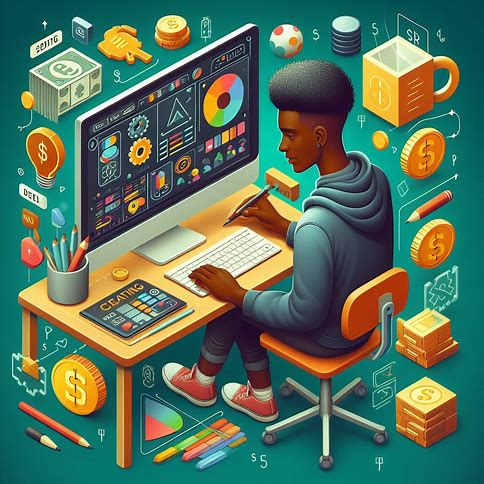Almost daily you come across stories of people striking it rich with cryptocurrency trading. You’re intrigued, and want to learn. The good news is, there are plenty of resources available to help you get started.
1. Online Courses and Tutorials
One of the most accessible ways to learn about crypto trading is through online courses and tutorials. These resources offer structured learning, often with video lessons, quizzes, and hands-on assignments to help you grasp the concepts. Some popular platforms and courses include:
– Udemy: Udemy offers a wide variety of courses on cryptocurrency trading, ranging from beginner-friendly introductions to more advanced technical analysis and trading strategies. Some top-rated courses include “The Complete Cryptocurrency Trading Course” and “Cryptocurrency Mastery: The Complete Crypto Trading Course.”
– Coursera: Coursera partners with universities and institutions to offer online courses, including those related to cryptocurrency and blockchain technology. While not exclusively focused on trading, courses like “Cryptocurrency and Blockchain: An Introduction to Digital Currencies” from the University of Pennsylvania provide a solid foundation for understanding the crypto space.
– YouTube Tutorials: For a more informal learning approach, YouTube is a treasure trove of crypto trading tutorials and guides. Channels like DataDash, CryptosRUs, and Coin Bureau offer a mix of market analysis, trading strategies, and educational content for traders of all levels.
How Many Days Do You Need To Learn Crypto Trading
When choosing an online course or tutorial, consider factors like the instructor’s expertise, the course syllabus, and reviews from previous students. Look for courses that offer practical examples and opportunities to apply your learning, as hands-on experience is crucial for developing your trading skills.
2. Trading Simulators and Demo Accounts
Online courses and tutorials provide a theoretical foundation but the best way to learn crypto trading is by actually doing it. However, diving straight into trading with real money can be very risky. This is where trading simulators and demo accounts come in handy.
– Trading Simulators: Platforms like TradingSim and Crypto Parrot offer simulated trading environments where you can practice trading with virtual funds. These simulators often use real market data and allow you to test out different trading strategies without risking any real money. They’re a great way to get a feel for the market and build your confidence before transitioning to live trading.
– Exchange Demo Accounts: Many cryptocurrency exchanges, such as Binance, Coinbase Pro, and Kraken, offer demo or testnet accounts. These accounts allow you to trade with virtual funds in a real trading environment, using the same interface and tools as live trading. Demo accounts are an excellent way to familiarize yourself with a specific exchange’s platform and features before committing real funds.
3. Books and Whitepapers
For those who prefer a more traditional learning approach, books and whitepapers can be valuable resources for learning about crypto trading. Some recommended books include:
– “Cryptocurrency Investing For Dummies” by Kiana Danial: This beginner-friendly book covers the basics of cryptocurrency investing, including market analysis, portfolio management, and risk mitigation strategies.
– “Mastering Bitcoin: Programming the Open Blockchain” by Andreas M. Antonopoulos: While not exclusively focused on trading, this book provides a deep dive into the technical aspects of Bitcoin and blockchain technology, which can be beneficial for understanding the underlying principles of the crypto market.
– “The Crypto Trader: How Anyone Can Make Money Trading Bitcoin and Other Cryptocurrencies” by Glen Goodman: This book shares the author’s personal experiences and lessons learned from trading cryptocurrencies, offering practical insights and strategies for navigating the market.
In addition to books, whitepapers can provide valuable insights into specific cryptocurrencies and blockchain projects. Whitepapers are often released by development teams and outline the technical details, roadmaps, and tokenomics of a project. Reading whitepapers can help you evaluate the fundamentals of a cryptocurrency and make informed trading decisions.
4. Crypto Trading Communities and Forums
Engaging with crypto trading communities and forums can be an excellent way to learn from more experienced traders, stay up-to-date on market trends, and share your own insights. Some popular platforms include:
– Reddit: Subreddits like r/CryptoMarkets, r/CryptoTrade, and r/CryptoCurrency are active communities where traders share news, analysis, and trading ideas. Remember to take opinions with a grain of salt and always do your own research before making trading decisions based on forum discussions.
– Discord: Many cryptocurrency projects and trading groups have Discord servers where members can engage in real-time discussions, share charts and analysis, and learn from one another. Look for servers run by reputable traders or projects and be cautious of any offers that seem too good to be true.
– Telegram: Similar to Discord, Telegram is a popular platform for crypto trading communities. Some groups focus on specific cryptocurrencies or trading strategies, while others offer more general market discussions and analysis.
When participating in trading communities and forums, be respectful, ask questions, and contribute your own insights when appropriate. Building relationships with other traders can lead to valuable learning opportunities and collaborations.
5. Podcasts and Webinars
For those who prefer audio-based learning or want to stay informed on the go, podcasts and webinars can be excellent resources for learning about crypto trading. Some popular podcasts include:
– “Unchained” by Laura Shin: This podcast features interviews with industry leaders, covering a wide range of topics related to cryptocurrency and blockchain technology, including trading and investing.
– “The Cryptoconomy Podcast” by Guy Swann: Focused on Bitcoin and Austrian economics, this podcast offers insights into the philosophical and economic foundations of the crypto space, which can inform trading decisions.
– “Crypto 101″ by Bryce Paul and Aaron Malone: This beginner-friendly podcast covers the basics of cryptocurrency, blockchain technology, and trading, with episodes featuring interviews with industry experts and thought leaders.
In addition to podcasts, webinars can provide valuable learning opportunities, often with live Q&A sessions. Many crypto exchanges, trading platforms, and industry experts host webinars on topics like market analysis, trading strategies, and risk management. Keep an eye out for upcoming webinars and register for those that align with your learning goals.
6. Mentorship and Paid Group Chats
If you need a more personalized learning experience, consider seeking out mentorship or joining paid group chats led by experienced traders. Mentorship can provide one-on-one guidance, tailored feedback, and accountability as you develop your trading skills. Look for mentors with a proven track record and a teaching style that resonates with you.
Paid group chats, often hosted on platforms like Telegram or Discord, can offer access to exclusive insights, trading ideas, and educational content from seasoned traders. However, be cautious when joining paid groups and always research the reputation and credibility of the organizers. Avoid groups that guarantee profits or make unrealistic claims, as they may be scams.
Remember, there’s no one way approach to learning, so try different resources and find what works best for your learning style and goals. Start with a solid foundation of understanding the basics, then gradually build your skills through practical experience and continuous learning.
Frequently Asked Questions
1. Do I need a background in finance or trading to learn crypto trading?
While a background in finance or traditional trading can be helpful, it’s not a requirement for learning crypto trading. Many successful crypto traders come from diverse backgrounds and have learned the necessary skills through self-study and practice. The most important qualities are a willingness to learn, dedication, and discipline.
2. How much money do I need to start trading cryptocurrencies?
The amount of money needed to start trading cryptocurrencies varies depending on the exchange and the specific coins you want to trade. Some exchanges have minimum deposit requirements, while others allow you to start with smaller amounts. It’s generally recommended to start with a small amount that you’re comfortable with and gradually increase your investment as you gain experience and confidence.
3. How long does it take to become a profitable crypto trader?
The time it takes to become a profitable crypto trader varies from person to person and depends on factors like your learning pace, dedication, and market conditions. Some traders may achieve profitability within a few months, while others may take longer. It’s important to have realistic expectations and understand that becoming consistently profitable requires time, effort, and continuous learning.
4. Are there any risks involved in crypto trading?
Yes, crypto trading involves risks, just like any other form of trading or investing. The cryptocurrency market is known for its high volatility, which means prices can fluctuate significantly in short periods. There’s always the potential for losses, and there’s no guarantee of profits. Additionally, the crypto space is still largely unregulated, which can make it more susceptible to scams and fraud.
5. Can I learn crypto trading while still having a full-time job?
Yes, many people learn crypto trading while maintaining a full-time job. Online courses, tutorials, and other learning resources can be accessed on your own schedule, allowing you to learn at your own pace. However, it’s important to manage your time effectively and not let trading interfere with your work or personal life. Start by dedicating a few hours per week to learning and practicing, and gradually increase your involvement as you become more comfortable.
6. Do I need to understand the technical aspects of blockchain to be a successful crypto trader?
While a basic understanding of blockchain technology can be beneficial, you don’t need to be an expert in the technical aspects to be a successful crypto trader. Many traders focus primarily on market analysis, trading strategies, and risk management. However, having a foundational knowledge of how cryptocurrencies and blockchain work can help you make more informed trading decisions and evaluate the long-term potential of different projects.
7. How do I stay up-to-date with the latest trends and developments in the crypto trading space?
To stay informed about the latest trends and developments in crypto trading, make use of a variety of resources. Follow reputable crypto news websites and blogs, join trading communities and forums, attend webinars and conferences, and engage with other traders on social media platforms. Additionally, regularly reading whitepapers and research reports can help you stay abreast of the latest technological advancements and project updates.










